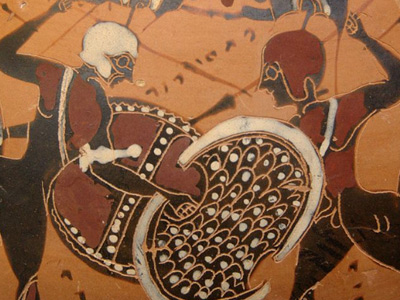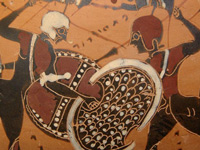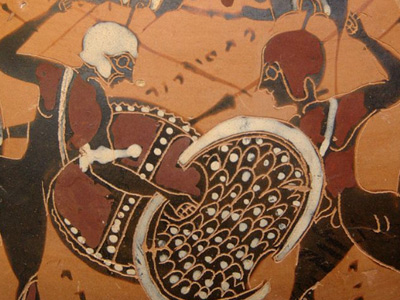First Peloponnesian War (460-445 BC)

Early Battles
As this war was beginning, Athens also took on a serious military commitment in another part of the Aegean when they sent a force to assist Inarus, a Libyan king who had led almost all of Egypt in revolt from the Persian king Artaxerxes. Athens and her allies sent a fleet of 200 ships to assist Inarus; a substantial investment of resources. Thus, Athens entered the war with her forces spread across several theatres of conflict.
The impact this had on the Athenians can be seen in an inscription dating to 460 or 459BC which lists the dead of the tribe Erechtheis. It is unusual in focusing on a single tribe as it was common for the dead of all ten tribes to be listed together on either a single Stele or several adjoining stelai with a common title. Perhaps it can be explained in this instance, however, by the unusually high death toll; 185 personal names are listed on the inscription in total. The list is preceded by an inscription which is translated thus: 'Of the tribe Erechtheis, these died in the war, in Cyprus, in Egypt, in Phoenicia, in Halieis, in Aegina, at Megara, during the same year'. This fits very closely with Thucydides' account, the last three chronologically following the order he gives. Thucydides does not, however, mention Phoenicia, so the inscription gives evidence for fighting in a place we would otherwise not associate with this period.
In either 460 or 459 BC, Athens fought a number of major battles against the combined forces of several Peloponnesian states. On land, the Athenians were defeated by the armies of Corinth and Epidaurus at Halieis, but at sea they were victorious at Cecryphaleia (a small island between Aegina and the coast of Epidaurus). Alarmed by this Athenian aggressiveness in the Saronic Gulf, Aegina entered into the war against Athens, combining its powerful fleet with that of the Peloponnesian allies. In the resulting sea battle, the Athenians won a commanding victory, capturing seventy Aeginetan and Peloponnesian ships. They then landed at Aegina and, led by Leocrates, laid siege to the city.
With substantial Athenian detachments tied down in Egypt and Aegina, Corinth invaded the Megarid, attempting to force the Athenians to withdraw their forces from Aegina to meet this new threat. Instead, the Athenians scraped together a force of men too old and boys too young for ordinary military service and sent this force, under the command of Myronides, to relieve Megara. The resulting battle was indecisive, but the Athenians held the field at the end of the day and were thus able to set up a trophy of victory. About twelve days later the Corinthians attempted to return to the site to set up a trophy of their own, but the Athenians issued forth from Megara and routed them; during the retreat after the battle a large section of the Corinthian army blundered into a ditch-ringed enclosure on a farm, where they were trapped and massacred.
HISTORY

RESOURCES
This article uses material from the Wikipedia article "First Peloponnesian War (460-445 BC)", which is released under the Creative Commons Attribution-Share-Alike License 3.0.
© Stories Preschool. All Rights Reserved.









